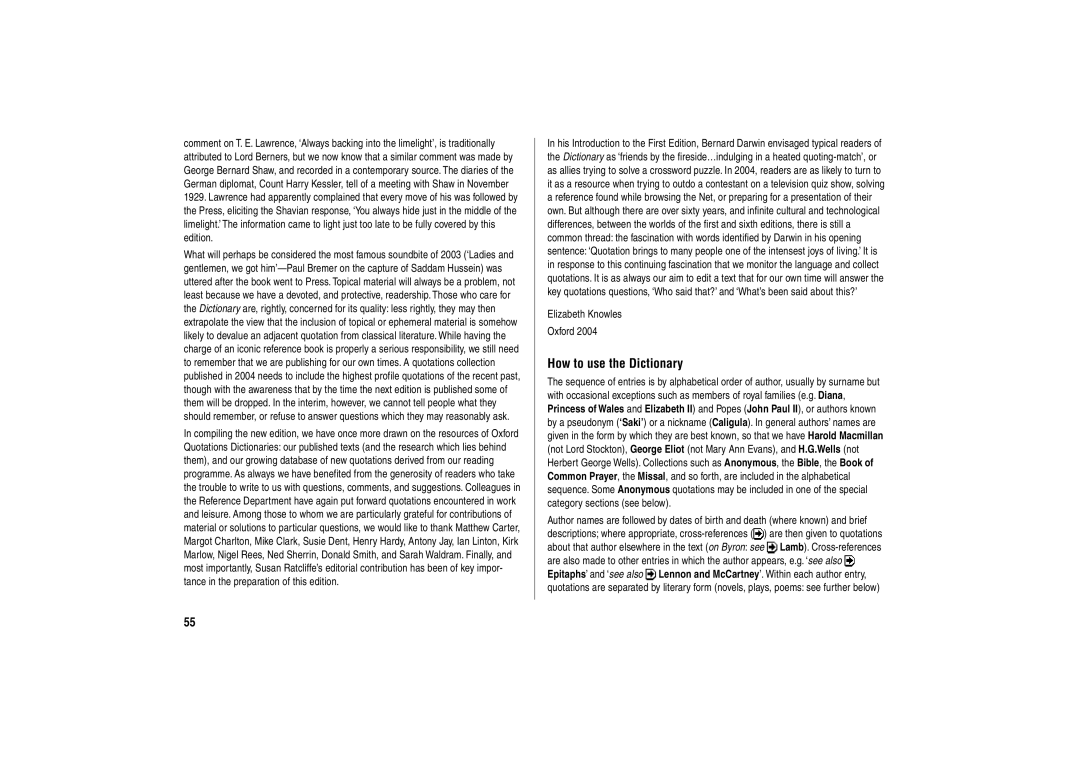comment on T. E. Lawrence, ‘Always backing into the limelight’, is traditionally attributed to Lord Berners, but we now know that a similar comment was made by George Bernard Shaw, and recorded in a contemporary source. The diaries of the German diplomat, Count Harry Kessler, tell of a meeting with Shaw in November 1929. Lawrence had apparently complained that every move of his was followed by the Press, eliciting the Shavian response, ‘You always hide just in the middle of the limelight.’ The information came to light just too late to be fully covered by this edition.
What will perhaps be considered the most famous soundbite of 2003 (‘Ladies and gentlemen, we got
In compiling the new edition, we have once more drawn on the resources of Oxford Quotations Dictionaries: our published texts (and the research which lies behind them), and our growing database of new quotations derived from our reading programme. As always we have benefited from the generosity of readers who take the trouble to write to us with questions, comments, and suggestions. Colleagues in the Reference Department have again put forward quotations encountered in work and leisure. Among those to whom we are particularly grateful for contributions of material or solutions to particular questions, we would like to thank Matthew Carter, Margot Charlton, Mike Clark, Susie Dent, Henry Hardy, Antony Jay, Ian Linton, Kirk Marlow, Nigel Rees, Ned Sherrin, Donald Smith, and Sarah Waldram. Finally, and most importantly, Susan Ratcliffe’s editorial contribution has been of key impor- tance in the preparation of this edition.
In his Introduction to the First Edition, Bernard Darwin envisaged typical readers of the Dictionary as ‘friends by the fireside…indulging in a heated
Elizabeth Knowles
Oxford 2004
How to use the Dictionary
The sequence of entries is by alphabetical order of author, usually by surname but with occasional exceptions such as members of royal families (e.g. Diana, Princess of Wales and Elizabeth II) and Popes (John Paul II), or authors known by a pseudonym (‘Saki’) or a nickname (Caligula). In general authors’ names are given in the form by which they are best known, so that we have Harold Macmillan (not Lord Stockton), George Eliot (not Mary Ann Evans), and H.G.Wells (not Herbert George Wells). Collections such as Anonymous, the Bible, the Book of Common Prayer, the Missal, and so forth, are included in the alphabetical sequence. Some Anonymous quotations may be included in one of the special category sections (see below).
Author names are followed by dates of birth and death (where known) and brief descriptions; where appropriate, ![]() ) are then given to quotations
) are then given to quotations
about that author elsewhere in the text (on Byron: see ![]() Lamb).
Lamb). ![]()
Epitaphs’ and ‘see also ![]() Lennon and McCartney’. Within each author entry, quotations are separated by literary form (novels, plays, poems: see further below)
Lennon and McCartney’. Within each author entry, quotations are separated by literary form (novels, plays, poems: see further below)
55
